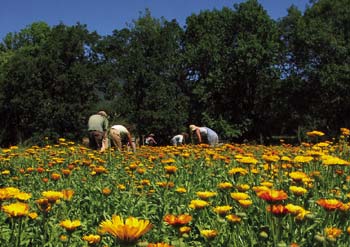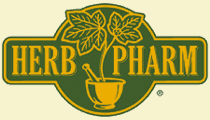SUSTAINABILITY profile
by Cameron Woodworth
This article was originally published in April 2004

Herb Pharm
Setting a sustainable tone for the herb industry
(April 2004) — It’s a comfort to know that, while taking care of your own health, you can help protect the environment as well. The folks at Herb Pharm, an herbal remedy company celebrating its 25th year, have created a line of 240 beneficial herbal products ranging from Echinacea to St. John’s Wort. At the same time, the southern Oregon-based company has developed a number of exciting programs to help sustain the planet.
At the heart of Herb Pharm’s sustainability efforts is its 85-acre certified organic farm, which the company calls the “Pharm Farm.” The farm, just two miles away from Herb Pharm’s manufacturing facility in Williams, Oregon, is ringed with medicinal trees such as Gingko, Hawthorn, Thuja and Chaste Berry. The farm boasts more than 100 species of medicinal plants, ranging from Chamomile to Calendula. More than half of the herbs sold by the company are grown here.
“Having our own farm assures consistency and quality from seed to shelf,” says company founder Ed Smith. “This includes procuring organic seed, planting and cultivating in appropriate soil conditions, harvesting at the optimal time of season and day, and then carefully drying and storing for future use, or for direct delivery of the fresh herbs to our production facility for immediate extraction.”
Farmers here employ a number of sustainable and organic techniques, from composting and inter-cropping (mixing crops to promote interaction between them) to the incorporation of permaculture (a philosophy of working with, rather than against, nature). Farmers strive to recreate the natural habitat best suited for each plant. Doing so helps Herb Pharm create herbs similar to those found in the wild. Providing a sound alternative to wild harvesting of herbs is important because of loss of habitat and over-harvesting.
The Pharm Farm, an official United Plant Savers Botanical Sanctuary, is committed to protecting diversity, growing as many as seven species of Echinacea as well as many other endangered species. United Plant Savers is a non-profit group that’s striving to protect the native medicinal plants of North America.
The farm also boasts two 1,500-square-foot greenhouses, which are used for the propagation of spring seedlings as well as the growing of tropical herbs such as Gotu Kola.

“We’re very dedicated to protecting the environment,” says Smith. “We’ve supported organic agriculture from day one. It’s part of our personal lifestyle.”
Education is another focal point at the Pharm Farm. A 1.5-acre botanical display and education garden has been set aside for the general public. Here, visitors will find hundreds of species of medicinal and aromatic plants. Moreover, the Pharm Farm helps to train herbalists of the future through its nationally renowned 13-week herbaculture work/study program. Students spend 30 hours a week working and learning farming techniques in the fields and greenhouses, as well as at least 12 hours of classroom instruction each week. Because it is a work/study program, there is no fee. “A lot of our former apprentices have started their own herb companies,” Smith says.
Herb Pharm was founded back in 1979 by Smith and Sara Katz. Ed had spent five winters in the 1970s in the South American jungle learning about plants from native healers there. He practiced herbal medicine in a Guatemala missionary clinic. In the early days, the company’s “lab” was in Ed and Sara’s kitchen. Even back then, the company stressed the importance of using organic herbs instead of the over-dried plant fiber that other companies were using. While the company remains a family business today, Herb Pharm now employs 75 people, selling products to health food stores, herbalists, naturopaths and medical doctors worldwide.
Smith has visited 60 countries in 20 years learning about those countries’ native herbs and working with indigenous cultures to preserve their plants. He spends about half his time traveling. “Everybody wants my job,” he laughs.
To learn more about Herb Pharm, visit www.herb-pharm.com.
